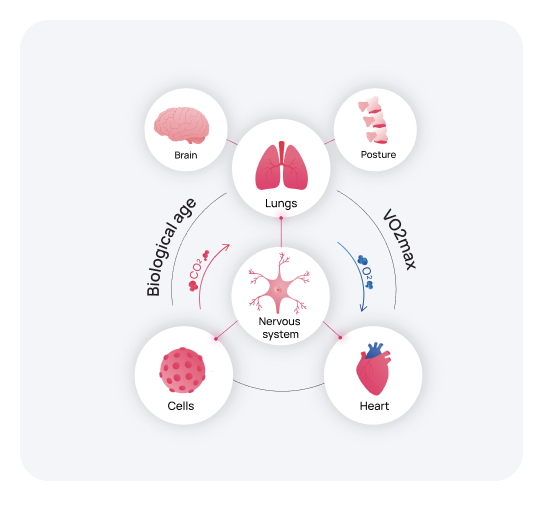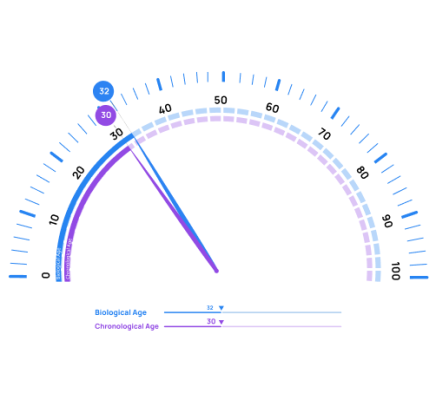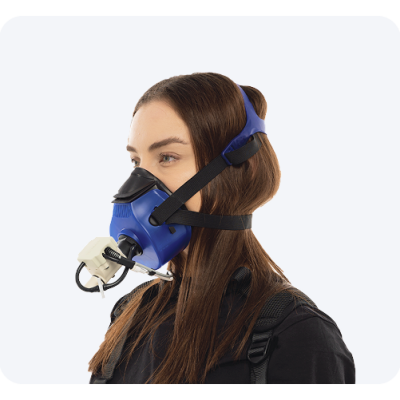VO2 Max Testing — The Leading
Biological Age &
Longevity Predictor
VO2 Max is the gold-standard measure of your body’s oxygen-processing capacity — and the most powerful predictor of metabolic age and longevity. This diagnostic reveals how efficiently your heart, lungs, and cells convert oxygen into energy, guiding precision health programs for every client.
What VO2 Max Reveals About Your Health
– A small jump from low to average aerobic capacity can reduce mortality risk by up to 70%.
– Oxygen capacity outperforms traditional risk factors (smoking, hypertension, diabetes) in predicting longevity.
– A Mayo Clinic study linked higher oxygen utilization efficiency to lower annual healthcare costs, saving $1,592 for every 1-MET increase.
– VO2 Max is key for optimizing metabolic age, improving energy and resilience.

– A small jump from low to average aerobic capacity can reduce mortality risk by up to 70%.
– Oxygen capacity outperforms traditional risk factors (smoking, hypertension, diabetes) in predicting longevity.
– A Mayo Clinic study linked higher oxygen utilization efficiency to lower annual healthcare costs, saving $1,592 for every 1-MET increase.
– VO2 Max is key for optimizing metabolic age, improving energy and resilience.
Because cardiorespiratory fitness measures aerobic capacity and cellular oxygen use — core drivers of metabolic health — it is the most precise marker of metabolic age.
Tracking VO2 Max empowers you to guide interventions that improve longevity, performance, and metabolic flexibility.

VO2 Max & Biological Age Connection
Because cardiorespiratory fitness measures aerobic capacity and cellular oxygen use — core drivers of metabolic health — it is the most precise marker of metabolic age.
Tracking VO2 Max empowers you to guide interventions that improve longevity, performance, and metabolic flexibility.
How We Measure
VO2 Max at PNOĒ
PNOĒ delivers clinical-grade breath analysis through portable breath analysis:
– A short, 10-minute, progressive session on a treadmill or bike.
– Real-time capture of oxygen consumption and CO2 production.
– Personalized VO2 Max score, biological age, and key biomarkers for performance and health optimization.

– A short, 10-minute, progressive session on a treadmill or bike.
– Real-time capture of oxygen consumption and CO2 production.
– Personalized VO2 Max score, biological age, and key biomarkers for performance and health optimization.
What to Know for
VO2 Max
Why Cardiorespiratory Fitness Drives Longevity &
Clinical Outcomes
– Longevity Predictor: Higher oxygen chain efficiency correlates with greater lifespan and healthspan.
– Chronic Disease Prevention: Linked to lower risks of cardiovascular disease, metabolic disorders, cancer [[JACC, 2022]].
– Healthcare Savings: Strong inverse link between VO2 Max and medical costs [[Mayo Clinic]].
– Athletic & Everyday Performance: Improves endurance, energy efficiency, and recovery.
– Precision Health Planning: Supports targeted exercise, nutrition, and bio-optimization.

Improving VO2 Max & Shifting
Metabolic Age
Your aerobic capacity and metabolic age are dynamic —
both improve with the right strategy:
– Aerobic training and HIIT intervals improve endurance and fat burn.
– Personalized nutrition (based on breath analysis) enhances metabolic flexibility.
– Bio-optimization services like IV therapy and red light therapy support VO2 Max gains.
– Wearable tracking syncs VO2 Max and metabolic metrics for actionable insights.

VO2 Max as a Superior Longevity & Disease Risk Predictor
A study published in the Journal of the American College of Cardiology highlighted VO2 Max as a powerful predictor of longevity and disease risk. Researchers found that individuals with higher levels of cardiorespiratory fitness had significantly lower risks of cardiovascular disease, metabolic disorders, and even certain cancers. The study emphasized that improving aerobic capacity through regular exercise—such as running, cycling, or swimming—can extend lifespan and enhance overall health. In fact, low oxygen capacity was shown to be a stronger predictor of mortality than traditional risk factors like smoking, hypertension, or diabetes, reinforcing its role as a key marker of long-term well-being.
Cardiorespiratory Fitness and Mortality Risk Across
the Spectra of Age, Race, and Sex
Authors: Peter Kokkinos, PhD; Charles Faselis, MD; Immanuel Babu Henry Samuel, PhD; et al.
Published in: Journal of the American College of Cardiology, August 2022.
DOI: 10.1016/j.jacc.2022.05.031

